How Should I Prepare for an Overseas Trip With Children
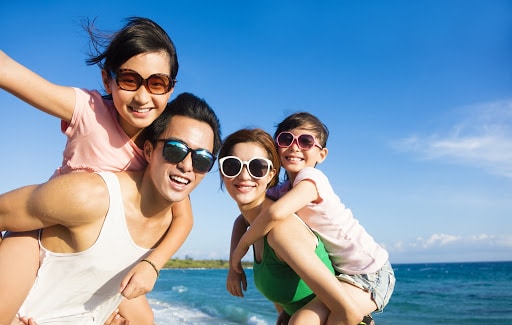
When it comes to travelling with children, some parents might find the idea a challenging one. However, it does not have to be a stressful and difficult experience. In this article, Dr Dave Ong has listed everything you need to do before, during and after your trip to make it a positive and memorable trip for your whole family.
What Travel Preparations Can Parents Make?
Preparations can start as soon as your tickets have been booked! The first thing you should do is to make an appointment with your paediatrician. Ideally, this should be about 4-6 weeks before you leave for your trip. Here is a simple travel checklist on what you should consult with your paediatrician on:
- Enquire about any vaccinations your child might need
Travel vaccinations are important as they can help prevent diseases such as Influenza, Typhoid, Yellow Fever, Hepatitis A and B, and Diphtheria just to name a few. The vaccination recommended will depend on the country you are travelling to. For example, Rabies vaccination will be helpful if you are travelling to a place where there might be a risk of coming in contact with wild or stray animals.
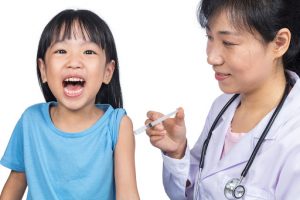
- Check if your child might need anti-malaria medication.
Again, this depends on which country you are travelling to. - If your child is prone to motion sickness you could ask your paediatrician for some motion sickness medication
- If your child requires specific medication while you are away, obtaining a medical letter explaining this from your paediatrician is advisable.
- Customize your child’s travel health kit with advice from the paediatrician.
Some items could include, allergy medication if needed, thermometer, fever medicine, diarrhoea medication, bandaids, antiseptic cream, etc. Such preparation can help reduce your anxiety if your child does fall ill overseas.
Staying Healthy During The Trip
When overseas, here are some general tips to ensure you have a smooth trip without your child feeling under the weather:
- Make sure that all of you are well-rested before the flight.
- If it is a long flight, try and nap on the plane so you are not as tired when you land in your destination.
- Planning some simple activities for your children to engage in on the flight will be beneficial in keeping them busy.
- Upon reaching your destination, follow the country’s time zone by not napping in the day and sleeping only when it is night-time. This will help all of you adjust to the new timezone better.
- Do not plan for any strenuous activities for the day that you land to ensure you get sufficient rest; you could instead just relax in the place you are staying, use their amenities and explore the area near where you stay.
Ensure Food and Water Hygiene
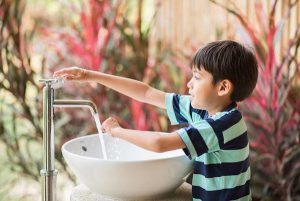
- The most important “tip” you and your children should always remember is to wash hands after using the toilet, and before and after eating.
- Choose food that has been thoroughly cooked and try to eat the food while it is warm.
- While street food is delicious, it might not be the best option for children so it is best to avoid eating street food.
- When it comes to water, stick to drinking either bottled water or water that has been boiled (for at least 1 minute). Canned drinks are suitable too but you should clean the mouth of the can and the bottles before you or your children drink from them.
- Avoid drinking tap water.
- If you are travelling with an infant, make sure you sterilise milk bottles by boiling them or for a more travel-friendly option, use sterilization tablets.
- You can also get sterilization tablets for drinking water should the need arises
- Avoid ice in drinks.
Safety and Protective Measures Outdoors
Sun Protection
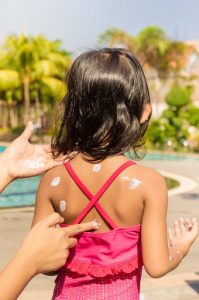
Ensure that you always use sunscreen even if it may seem like it is not sunny . 15 SPF or more is recommended. Be sure to re-apply every few hours. If you are going to be engaging in water activities, you can opt for a waterproof sunscreen for maximum protection. Try to arrange indoor activities or time to rest when it is the afternoon to avoid the midday sun.
Mosquito Protection
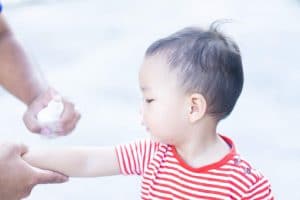
- Ensure your children wear long pants and long-sleeved shirts when you do outdoor activities like hiking.
- For children, you should use repellents containing 7-20% DEET and around 20-35% DEET for adults.
- Follow the instructions on the repellent you purchase on how often it needs to be used and if it can be used directly onto the skin or on the clothing.
Safety in the Water
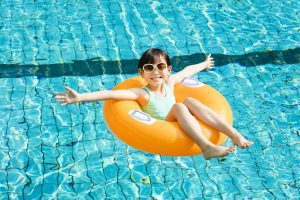
- Do not swim in water bodies with no lifeguard around and when no one else is in the water as you do not know what the water might be contaminated with. It is generally safer if other families or people are in the water.
- Most importantly, make sure you keep a close eye on your children when they are in the water.
Protection Against Animal Bites
- If you are going to a place where there might be wild or stray animals, make sure you or your children do not approach or pet them.
- If your children are bitten by any animal, wash the injury immediately with soap and clean running water. Apply some antiseptic cream to the injury and go to the nearest medical facility for further evaluation.
- If your child is bitten by a snake, use a pressure bandage and ice if you have access to it, do not move the wounded area and go to a medical facility immediately for proper medical attention.
What Happens When My Child Seems Ill After Coming Home?
If you notice your child is feeling unwell after you return from your holiday and observe symptoms such as fever, vomiting, diarrhoea, a visit to the paediatrician is highly recommended.
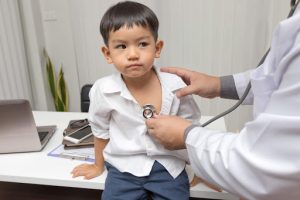
Some pre-travel preventive medication might also require a follow-up with the doctor. For example, if your child is taking anti-malaria medication, he/she would have to complete the course as it will last for up to 4 weeks after you return home.

